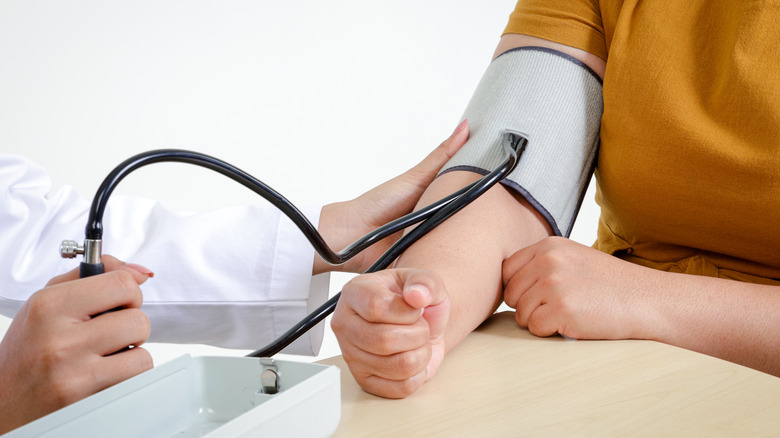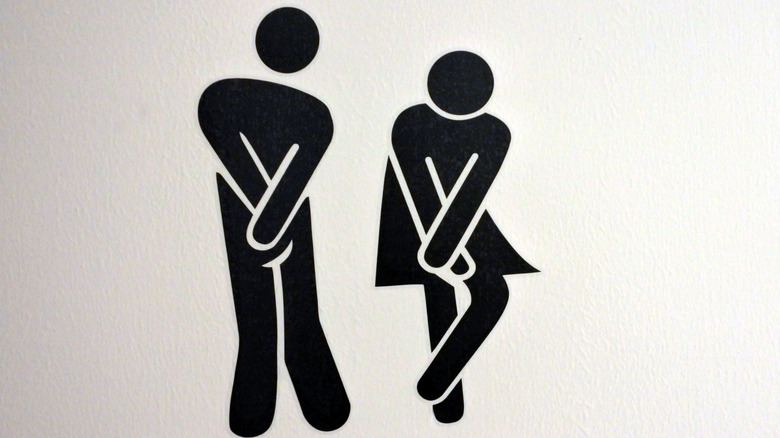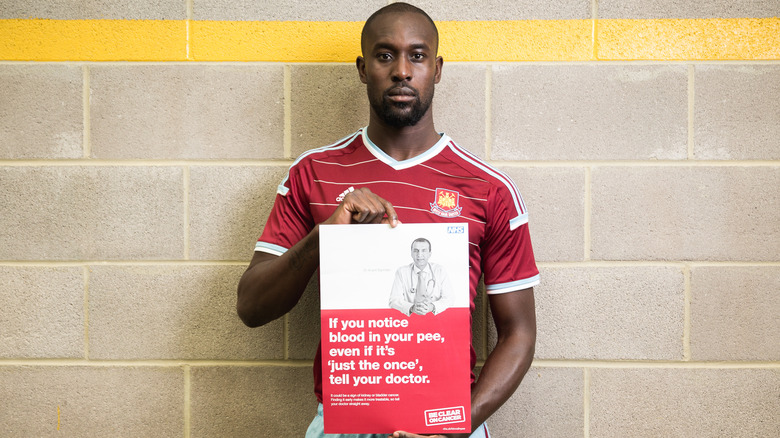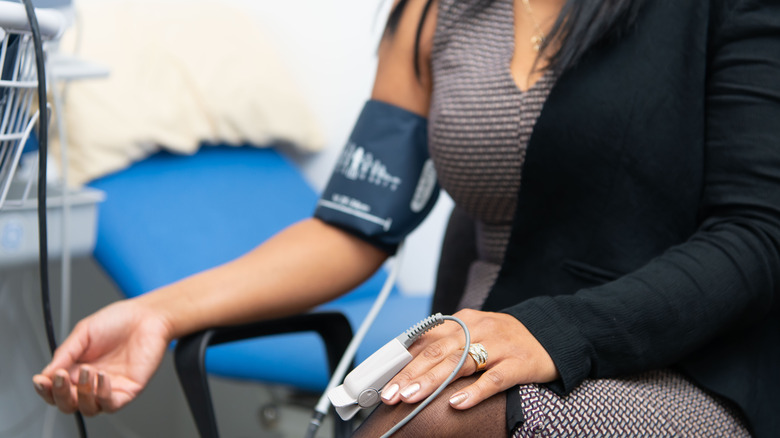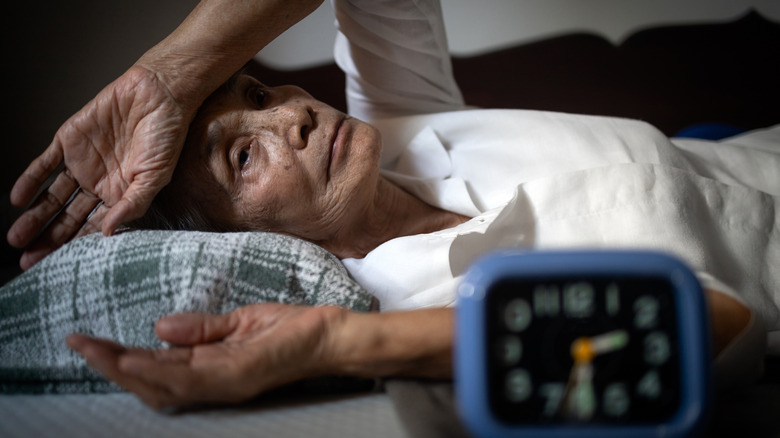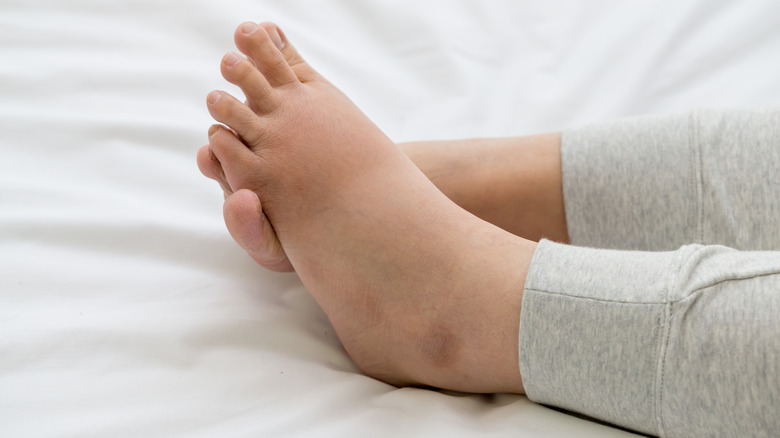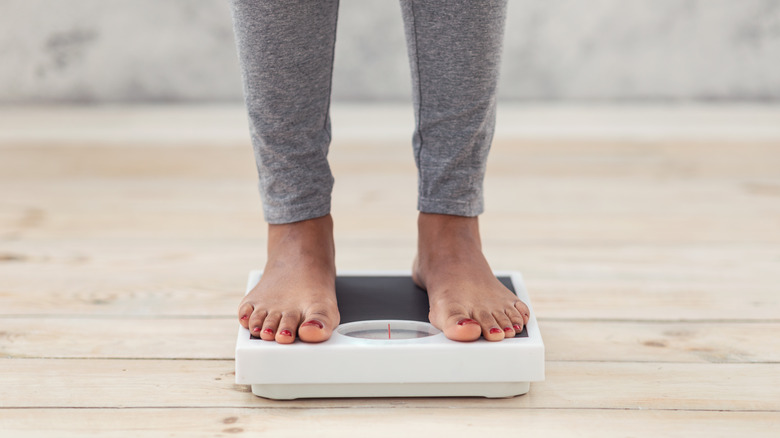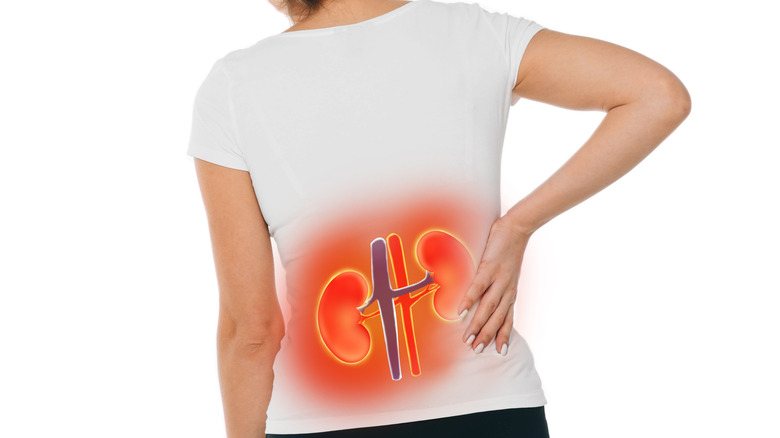Warning Signs From Your Kidneys You Shouldn't Ignore
Approximately 37 million people in the United States are thought to be living with chronic kidney disease, according to the Centers for Disease Control and Prevention (CDC). That means that 1 in 7 Americans have varying degrees of kidney disease and damage, though many of them don't even know it. How? Signs and symptoms of chronic kidney failure begin so slowly that you may not notice when they start. Most are also symptoms of other conditions, which can make kidney disease hard to diagnose.
Your kidneys are vital organs, which means you cannot live without them. These two bean-shaped organs are each about the size of your fist. They are located at the bottom of your ribs — one on each side of your spine. Occasionally, though, some people are born with just one kidney. Kidneys perform many important jobs. Their main function is removing (excreting) waste products and extra fluid from the body through urination. Urination, or peeing, is not just "liquid in, liquid out." Producing urine requires your kidneys to perform complicated steps in order to maintain the proper balance of fluids, sodium (salt), and other necessary chemicals in your body.
Every 24 hours, they filter out waste products, return clean fluid back into the bloodstream. Approximately 200 quarts of fluid are filtered per day (via National Kidney Foundation). Your kidneys also produce hormones, which control many important functions, such as producing red blood cells, regulating blood pressure, and producing vitamin D for bone health, to name just a few.
Causes and risk factors of kidney disease
There are many conditions that can cause the kidneys to malfunction or even shut down due to injury or chronic kidney disease, also called chronic kidney failure. When kidneys do not work properly, other body systems malfunction and become damaged, especially if you have another health condition. These diseases are referred to as comorbidities.
Anyone of any age can have chronic kidney disease, according to the National Kidney Foundation Mayo Clinic. However, there are certain risk factors that increase your chances of developing kidney disease. While many of these risk factors cannot be changed, some are modifiable. Risk factors include diabetes, high blood pressure (hypertension), heart disease, smoking, obesity, and being 60 years of age or older.
Whether or not you have risk factors, you should monitor your body for danger signs that your kidneys are in distress. If you notice any signs or symptoms that are causes for concern, consult your doctor immediately.
Frequent urination, especially at night
The urge to pee more than you would normally have to can be cause for concern. In cases of chronic kidney disease, the kidneys' waste filters are damaged and their ability to reabsorb fluid and excrete waste is disrupted (via National Kidney Foundation). Excess fluid and waste products build up in the body, causing an increased urge to pee. These waste products can cause the urine to be darker in color as well.
Urinary tract infections, common with kidney disease, also are a major cause of frequent urination, though have other symptoms, such as pain and burning when you pee, according to the National Kidney Foundation. In late-stage kidney failure, there is a marked decrease in urination (Johns Hopkins Medicine). Frequent urination can also be a sign of diabetes, which is the primary cause of kidney disease.
Your urination habits are a major factor in detecting possible kidney damage. The earlier kidney damage is detected, the easier and more successful the treatment. Keep an eye out for any changes, even if they don't cause pain. Any change from your normal urination means you should contact your doctor.
Blood in urine
The presence of blood in your urine can be frightening. Though there may be nothing wrong, you should trust your feeling of concern because blood in the urine can signal many harmful conditions, such as infection in the urinary tract, bladder, or kidneys; kidney cancer, kidney stones, and kidney disease (via Mayo Clinic). With an infection or kidney stones, you may experience pain while peeing. Many of these conditions can be caused by chronic kidney disease.
Healthy kidneys keep your blood cells in the body as they filter out all the waste products that ultimately form urine. However, in kidney disease, the kidneys' filtering system is damaged and blood cells flow or leak into the urine, which is then visible as blood when you pee, according to the Mayo Clinic. Any blood in your urine should be reported to your doctor immediately, as bloody urine is a red flag that something is wrong.
Foamy urine and puffiness around the eyes
These two signs can't possibly be connected ... can they? When the kidneys' filtering system is not functioning well, protein leaks not only into the cleaned fluid, but also your urine. This protein is the same protein found in egg whites, called albumin. When you scramble eggs, do you notice how the eggs foam up? The albumin reacting to air is what creates that bubbly foam. This is the same process happening in your body with kidney damage and disease (via Healthline). Bubbles form in the urine, usually requiring you to flush the toilet several times to get rid of all the bubbles. If you see excessive bubbles in the urine, you most likely have protein in your urine.
Protein in your urine not only causes foamy urine — it also causes puffiness around your eyes, especially in the morning, according to the National Kidney Foundation. However, puffy eyes can be a symptom of many other conditions. Look for other signs and symptoms in conjunction with puffy eyes, and be sure to consult your doctor.
Dry and itchy skin
Damaged kidneys, especially in advanced kidney disease, are not able to create the correct balance of nutrients and minerals in your blood. One such mineral is phosphorus, which can cause dry and itchy skin when too much is present in the blood, according to the American Academy of Dermatology Association. This symptom can be treated easier than many others, once your doctor determines that kidney disease is the cause.
A dietitian can help you reduce the amount of phosphorus in your diet, and prescription medication is also available to combat this frustrating symptom (via Mayo Clinic). Ultraviolet light absorption from a UV light or the sun may also help. UV lights are affordable and available over the counter. Consult your doctor about which treatments would be best for you.
Like many other signs and symptoms of kidney disease, itchy skin alone may not be cause for concern and is a result of myriad causes. If your itchy skin does not go away in a few days after treating it at home, contact your doctor, as something more systemic may be involved.
High blood pressure
Hypertension, or high blood pressure, is defined as 130/180 or higher. The top number is your systolic pressure and the bottom number is your diastolic pressure. According to the CDC, almost half of U.S. adults (116 million) have high blood pressure, and only about 25% have their high blood pressure under control with treatment. Hypertension is a major risk factor for heart disease and stroke, the leading causes of death in the United States.
High blood pressure can both cause and be a result of kidney disease. If hypertension damages your kidneys, they won't be able to control your blood pressure as well, resulting in a dangerous cycle (via National Kidney Foundation). Your kidneys are unable to get rid of extra fluid, causing inflammation (swelling), which then raises blood pressure and causes your heart to work harder. You can help combat this symptom with blood-pressure-lowering medications and lifestyle changes like limiting your salt intake, balancing your fluid intake, taking, exercising, quitting smoking if you are a smoker, and using stress management techniques. Your doctor will play a major role in helping you manage your blood pressure, and depending on your condition, you may require referral to a cardiologist.
Poor sleep (insomnia)
Lack of sleep and poor sleep is an epidemic in the United States. Because so many factors are involved in insomnia, this symptom alone does not indicate kidney disease, but it can help you and your doctor find out if your kidneys are involved when insomnia is present in conjunction with other symptoms related to kidney disease (comorbidities), according to the Cleveland Clinic.
The National Kidney Foundation explained that the toxins unable to be filtered out of the blood by damaged kidneys build up in the body, causing difficulty sleeping. Two major comorbidities include sleep apnea and obesity. Sleep apnea is also more common in people with kidney failure than in the general population. Obesity is also known to negatively impact sleep. Add in frequent nighttime trips to pee more often, nausea, possible anemia, muscle cramps, pain, restless leg syndrome, constant itching, and a host of other kidney-related symptoms, and it's no wonder insomnia is so prevalent with chronic kidney disease.
There is no magic pill to fix insomnia, but working with your doctor on a sleep plan and finding the root cause will start the process to achieve better sleep. A sleep study may be recommended. Lifestyle changes may be required as well as cognitive behavioral therapy, which may include meditation or mindfulness practices.
Chronic fatigue and inability to concentrate
Much like with insomnia, the buildup of toxins in the blood can cause tiredness, weakness, and affect your ability to concentrate. Chronic kidney disease can also cause anemia, which can also lead to weakness, fatigue, and difficulty sleeping, according to the National Kidney Foundation. Anemia results when the kidneys are unable to make enough of the hormone required to make new red blood cells. Less red blood cell production results in less oxygen reaching organs such as your heart and brain, impairing their function. Iron supplements and other medications can help combat this symptom. Diagnostic tests are required to find the root cause, however.
A 2016 study published in The CANNT Journal found that chronic fatigue can result in a severe decrease in quality of life. It can be debilitating, negatively impacting your ability to work, your home and family life, social life, and personal hobbies and habits. When quality of life is decreased for an extended period of time, depression can develop. You and your physician should be aware of the symptoms of depression so that you can start treating it before it becomes severe.
Muscle cramping and restless leg syndrome
Your kidneys are responsible for helping balance important electrolytes in your body. Damaged kidneys can impair this vital function and cause electrolyte imbalances, which can result in muscle cramping. Muscle cramping from chronic kidney disease can be caused by low calcium levels and excess phosphorus (via National Kidney Foundation). Diagnostic testing may be able to find the root cause, which can then be treated with diet, supplements, or other home therapies.
Additionally, damaged kidneys may also be responsible for your restless legs syndrome. This disorder is common in the general population, affecting up to 1 in 10 people, but is even more common in people suffering from chronic kidney disease (via Kidney Care UK). Your legs may twitch and move seemingly on their own, or you may experience an urge to move them constantly. It most often occurs at night when you are trying to sleep. You may also experience the same symptoms in your arms.
Though it can occur earlier in the disease process, restless legs syndrome typically occurs in later kidney disease, especially if you are receiving hemodialysis (via Mount Sinai). The anemia and high blood calcium levels experienced in chronic kidney disease can make restless legs syndrome worse. Thankfully, there are treatments available for restless legs syndrome.
Swelling in the ankles and feet
Sodium is retained in the body when kidney function is decreased. This extra sodium causes fluid to build up in your feet, and ankles, according to the Mayo Clinic. However, fluid retention occurs throughout the body in chronic kidney disease and can even affect the brain, lungs, and heart. This swelling is also called edema. Gravity causes the fluid to build up in your extremities.
Besides swelling, symptoms of edema include puffy and shiny skin, achiness and tenderness, water weight gain, skin color changes, stiff joints, and pitting edema. Pitting edema occurs when an area of skin remains indented if pressed on by a finger. Pitting edema should be reported to your doctor immediately.
Treatment of this uncomfortable symptom includes diuretic medication, which helps the body get rid of excess fluid. However, this is only a short-term treatment as diuretics can cause further kidney damage.
Appetite and weight changes
Weight and appetite changes are not always indicative of kidney damage or disease, according to the National Kidney Foundation. They can be caused by many different conditions, and sometimes just poor nutrition. Nevertheless, these are symptoms to watch out for when they are present with other kidney disease symptoms.
The buildup of toxins resulting from reduced kidney function can be one of the causes of these symptoms. As kidney disease progresses, eating may become harder to do and toxin buildup may lead to nausea and vomiting. Loss of appetite and interest in food may occur, your food may taste different or unpleasant, and chronic infections related to kidney dysfunction can make it hard for your body to get the proper nutrients it needs from the food you are able to eat. All these problems can lead to unhealthy weight loss. A dietitian may be required to help fight these persistent symptoms.
Low libido and infertility
The ability to have and enjoy sex is dependent on many factors. Simply, when you don't feel good, your sex life can suffer. Chronic kidney disease affects your hormones, which then affect your emotions and can impact your mental health (via Mayo Clinic). Lack of sleep, low energy, nausea, and more can also undoubtedly negatively impact your sex drive. High blood pressure and blood glucose (sugar) levels associated with kidney disease can also lead to erectile dysfunction. Depression and anxiety, mental health issues often present with chronic kidney disease, also affect your sexual relationships. Both can sap your sexual desire.
Chronic kidney disease can also impact a person's fertility, according to a Lund University study. Additionally, "women with kidney failure are usually advised against becoming pregnant" because "the rate of complications is very high," the National Kidney Foundation explained. The foundation continued, writing, "If you become pregnant, you will need close medical supervision, changes in medicine, and more dialysis to have a healthy baby."
Chest pain and shortness of breath
All that excess fluid buildup in the body can affect more than just your ankles, and feet. In late-stage kidney failure, fluid can surround the heart causing inflammation and chest pain, according to the Mayo Clinic. Excess fluid can also enter the lungs and surround the lungs causing shortness of breath and overall difficulty breathing. Normal daily functioning may be difficult to impossible when experiencing these heart and lung symptoms. The stress on your heart and lungs can cause you to easily become fatigued, as well as overall fatigue and weakness.
Any chest pain or persistent shortness of breath should be addressed with your doctor immediately. Like the kidneys, your heart and lungs are vital organs, meaning you cannot live without them. When these organs are in distress, the whole body is affected as blood circulation is negatively affected and the proper amount of oxygen is not being provided to your body.
Kidney pain
Kidney pain is easily mistaken for back pain because both are felt in the back; however, kidney pain is felt deeper, in your side(s), and higher up your back, to the left or right of your spine, according to the Cleveland Clinic. The pain may also travel to other areas of your body, such as your groin or abdomen.
While kidney pain may not be a direct result of kidney disease, it is often a result of conditions caused by damaged kidneys. The pain results from swelling of the kidneys or a blockage in the kidneys or urinary tract. Kidney disease can result in urinary tract infections and kidney stones, both of which can cause swelling and blockages.
If you have kidney pain coupled with fever, painful urination, and vomiting, the pain is likely the result of a kidney problem (via Cleveland Clinic). Trauma to the kidneys, such as during a contact sport, vehicle accident, or fall, can also cause kidney pain and is a medical emergency. Any kidney pain should be treated as soon as possible.


